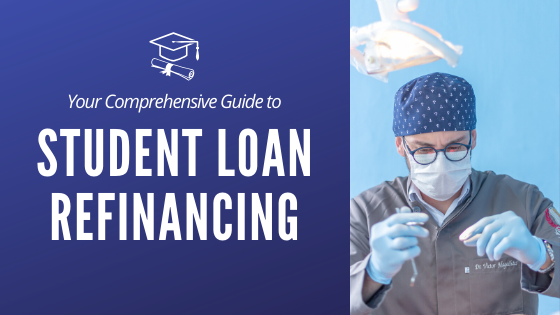Are you feeling the pressure of your high student loan payment? Many graduates, especially doctors and dentists, deal with high loan payments since higher education costs have risen by more than twice the inflation rate! Besides that, many interest rates are relatively high and fluctuate around 6-8%. This is much higher than mortgages or car loans and can make payments larger than they need to be.

This comprehensive guide will teach you how refinancing student loans work along with other related topics.
You can refinance most types of loans like mortgages, auto loans, and student loans. This simply means that you pay off your current loan and replace it with a new one that has a lower interest rate. If you can reduce your rate by even a percent or two, this can save you thousands over time.
For example, refinancing a $230,000 loan with a 7% rate and a term of 120 months to just 5.5% can save you approximately $20,000. This can make a huge difference long term and you can use this student loan refinancing calculator to see the cost savings in various refinancing scenarios.
It’s important to note that refinancing is different from consolidation. Consolidation refers to combining all of your debts and having one monthly payment without lowering your rate. This will make your finances more organized, but you won’t save on interest costs. You can only consolidate federal loans, while you can refinance both federal and private loans.
Both private and federal student loan holders can be eligible for refinancing. However, student loan refinancing companies are considered to be private companies, and terms may differ for each one. If you have federal loans, refinancing will reclassify them as private. Refinancing could make you lose federal protection, such as income-based repayment (IBR) plans, public sector loan forgiveness, and deferment/loan forbearance.
Be sure to weigh all of your options before refinancing if you have federal loans. In some cases, it might make more sense to seek out public loan sector forgiveness. For example, doctors can use Public Student Loan Forgiveness programs, to have their remaining balance erased after 10 years of payments. They have to work full-time for a non-profit or public service agency to ensure that the balance will be forgiven!
Also, many lenders have different requirements, but they’ll generally require you to have a good credit score (FICO at least 600), consistent income, repayment history, and some savings. If you don’t have any of these, you could have a co-signer on the loan with you. This can help you save on interest, but the co-signer will also be responsible for your debt.
Some major pros to refinancing student loans include:
In a previous example, you learned that even reducing your rate by as little as 1% can help you save thousands of dollars. Little details like this can make a significant impact and you can use the savings to improve your overall financial plan. For example, you can use the savings to add to investment accounts and build savings. These actions will give you both present and future financial security.
You also access a wider selection of lenders, compared to federal loans. It will be easier to access these options once you’ve increased your credit score and improved your debt-to-income ratio.
When you take out student loans, it’s likely that you have payments with numerous lenders. Refinancing can help you group all monthly payments together and create a new loan with a different rate to replace them. It can help you both organize your debts and save on interest! Some lenders like SoFi allow you to transfer Parent PLUS Loans that are in your parents’ name to yours.
Even though private lenders don’t offer the protection of federal loans, they still have some unique perks. For example, you can potentially remove a cosigner from your old loan with the new refinanced loan. This can be quite helpful if you don’t want a family member responsible for your debt. Other private lenders offer special conditions like temporarily pausing payments due to unemployment. You can also benefit from unique perks like accessing career coaches or licensed financial counselors with private lenders.
Many private lenders offer unique benefits, but they aren’t as powerful as federal payment plans. If you work with a private lender, you aren’t eligible for Income-Based Repayment plans (IBR) and deferment terms are more generous with federal lenders. For instance, you could possibly defer your loans for up to three years if you’re unemployed during that time.
Refinancing loans is irreversible, meaning it can’t be altered once the contract is signed. Think carefully before signing paperwork, and evaluate the pros and cons. Also, many lenders have strict requirements like demanding that you have a steady job and a credit score above 650. Not everyone qualifies for this benefit.
If you refinance your loan, you’ll lose federal protection, including public sector student loan forgiveness. Dentists and Physicians should especially consider this disadvantage as many programs can forgive their debt after a certain amount of years.
If you just graduated and refinanced your loans, then you’ll lose the grace period privilege. Many loans offer new graduates a 6 month grace period after their graduation dates, in which they don’t have to make payments.
Interest rates might be low, but it’s tough to predict them in the future. They could rise substantially and refinancing can be a useful way to lock in the lowest rate. Having the lowest rate will reduce your monthly payment and can save you thousands of dollars. You can also change the terms of your loan during this time.
Refinancing can help you obtain the ideal repayment term for your needs. It can also let you drop cosigners from existing loans. While you might not have federal loan protections, you can have flexibility and gain other special perks with a refinanced loan. Some perks like accessing free career and financial counselors can help you make better decisions. They can also let you save money by not paying for these extra professionals separately.
Rates are low, but refinancing might not be the ideal situation. If you’re satisfied with your current rate, terms, and monthly payment; it might not make sense to go through the refinancing process. Refinancing could possibly be unsuitable for your situation if you value federal protection/payment programs. It wouldn’t be a good fit if you’re planning on public service forgiveness options as well.
The first action you should take when learning how refinancing student loans work is to find a student loan lender. You can use sites like Nerdwallet or Student Loan Hero to find several options. You can read reviews and learn about the minimum criteria of each company.
These comparison sites clearly show you the interest rate ranges, accepted loan types, eligible degrees, and loan terms. From there, drill down deeper to find out about credit score standards, income requirements, and minimum/maximum eligible loan balances.
Your interest rate is one, if not the most important factor when understanding how refinancing student loans work. Start by inquiring about fixed vs. variable rates. Fixed rates stay the same over the course of the loan, while variable ones can change. You might be better off with a fixed-rate loan, as your payment won’t increase. If you apply for federal loans, then a fixed rate is your only option.
There are many factors to consider when selecting a lender. First, be sure that the institution is credible and you can use sites like Yelp or Trustpilot to read customer reviews. You want to ensure that this company is legitimate and treats its clients well.
Working with a financial planner also has many benefits, like being able to access their network. Many advisors have relationships with lenders like Commonbond that can give you preferred rates and terms. The right advisor will also conduct thorough research on your loan, refinancing options, and potential lenders.
It’s also necessary to learn more about a lender’s fees which could include origination or prepayment fees. These make your loan more expensive than necessary, especially prepayment fees. Prepayment fees charge you extra should you pay off your loan earlier than the desired term. This prevents the lender from losing interest payments.
You should also inquire about special terms a lender might offer like interest-only or even paused payments during tough times. Most importantly, learn how you can access customer support and if that team is responsive.
You’ll likely see that companies offer a wide range of student loan rates. Keep in mind that many shoppers don’t get the best-advertised rate and there can be room for negotiating. It’s also wise to apply with at least three lenders since you still need to be approved for the loans.
Student loan payments can seem high, especially for high earners like doctors and dentists. Education costs are exponentially growing every year, which is why you must think strategically about any future or current debt burden. Start with evaluating your interest rate, as it can make your payment larger than it needs to be.
Learning how refinancing student loans work, which includes its advantages, disadvantages, and how to evaluate lenders could help you save thousands of dollars. These savings can help you get out of debt quicker, build emergency funds, and/or grow your investment accounts!
When it comes to medicine, it takes a trained professional to answer complicated questions and base recommendations on the patient’s individual circumstances. Why wouldn’t the same apply to your student loans? One size does not fit all. That’s why you should consult an expert to help avoid mistakes, eliminate headaches, and feel confident in your student loan game plan.
CRN202205-265417

Partner and Financial Planning at Spaugh Dameron Tenny.
Making the decision to buy into a surgery center is a significant financial and career move for any physician. While it can be a profitable ...
Read More →One of the biggest financial decisions physicians and dentists make involves buying, building, or renovating a house. If you've gone through this ...
Read More →Dental service organizations (DSOs) have gained popularity by enhancing practice efficiency and profitability through their expertise, resources, and ...
Read More →